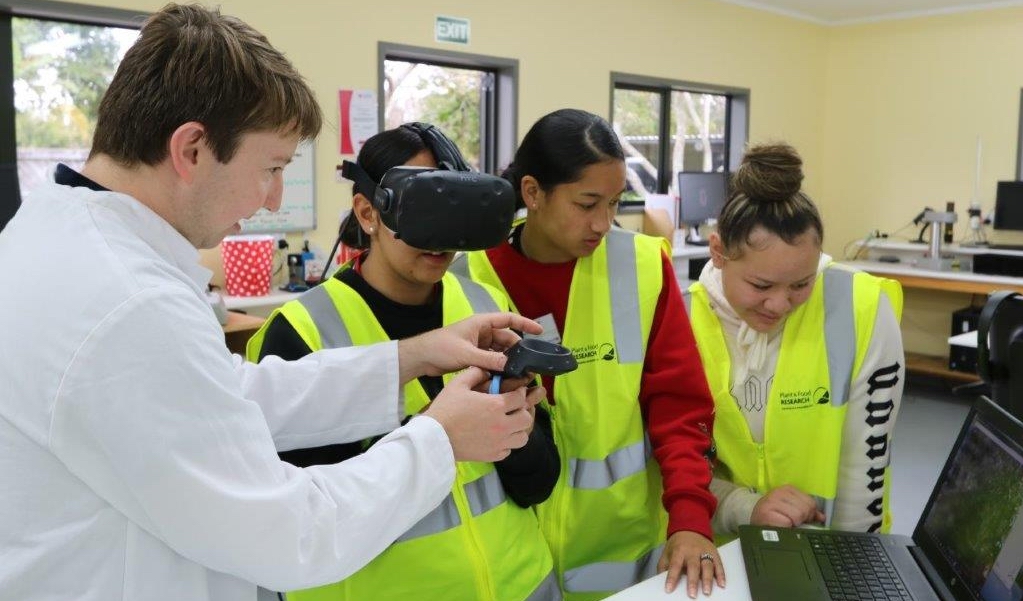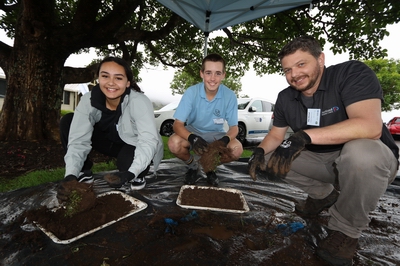Professional primary industries offer rich career pickings
3 Oct 2018
Dissecting a fanworm may not be everyone’s idea of a great day out, but it was a popular activity for secondary students participating in two recent Find Your Future careers events.
 Northland College students are fascinated by their virtual reality tour of a kiwifruit orchard with Scientist Peter McAtee from Auckland’s Plant and Food Research Centre.
Northland College students are fascinated by their virtual reality tour of a kiwifruit orchard with Scientist Peter McAtee from Auckland’s Plant and Food Research Centre.
Around 80 students from eight schools took part in the Whangārei event and a further 40 students from six schools attended a similar event in Kerikeri. Both events were aimed specifically at attracting young people into careers within Northland’s professional primary industries.
The events, a first for Northland, were organised by the Northland Regional Council and its Enviroschools team and the Whangarei Agricultural & Pastoral Society, with support from the Ministry of Primary Industries, NIWA, Plant and Food Research, Rabobank, Seeka and Tahi Honey NZ.
In addition to interactive workshops, the students had the opportunity to see professional primary industries in action with visits to NIWA or Tahi Honey in Whangārei, and SEEKA or Plant and Food Research in Kerikeri.
“Northland’s professional primary industries offer well-paid, diverse and rewarding career opportunities, yet often struggle to fill positions,” regional council Chairman Bill Shepherd told the students. “These events can open your eyes to new opportunities and may influence what you want to study when you leave school.
You don’t have to leave Northland for good to get a high paying career in the professional primary industries – you can do it right here.”
Primary industries professionals acted as role models during the events, sharing their career pathways and engaging the students through practical experiences including soil analysis, sediment sampling, microscopic examination and identification, GIS mapping, rural banking farm purchase calculations and quizzes.
In one room, young people in white laboratory coats gathered around a table, trying their hand at fanworm dissection, subjecting the marine invaders to microscopic examination and asking questions of regional council marine biosecurity professionals.
In another, a lively quiz with thought provoking questions created a keen sense of competition and gave students a better understanding of the role and work of the Ministry for Primary Industries.
Laboratory technicians from the orchard-to-market company SEEKA shared their career pathways and showed the students how to brix test for sweetness and identify plant pests through microscopic examination.
 From left, Bella Wati (Whangarei Girls’ High School) and Devlin Gurr (Whangarei Boys’ High School) find out more about soil composition from Mike Mitchell, NRC Land Management Advisor (Hill Country).
From left, Bella Wati (Whangarei Girls’ High School) and Devlin Gurr (Whangarei Boys’ High School) find out more about soil composition from Mike Mitchell, NRC Land Management Advisor (Hill Country).
There was a chance to get dirty in the soil analysis sessions where students first dug soil samples for visual assessment and then tested them to determine soil health.
Knitting needles were used to gauge sediment accumulation in the marine environment with analysis showing how people have impacted negatively on this ecosystem.
Rabobank’s farm purchasing exercise taught students calculations reinforcing that farming is big business involving millions of dollars. Rural bankers talked about how they came to be in the business and inspired students with their earning potential.
Bringing data to life by tracking the path of Cyclone Florence, the point where it touched down, where it went and what it did after that, was part of the GIS exercise which introduced students to the wealth of free open source data.
Whangarei Agricultural and Pastoral Society president Murray Jagger told the students about 33,000 jobs would be available in New Zealand’s agrisector by 2025.
“Take science courses, keep going and keep an eye on this sector,” he advised. “It’s rich in opportunity and reward.”
Among the learnings shared by participating students were: “There are SO many agribusiness jobs; banking isn’t all about money and it isn’t boring; there are multiple jobs in NRC and MPI.”
Some students said they would now consider taking science subjects to keep their employment options open and one teacher commented that “it was great to see Year 11s engaged in applied science and maths.”
